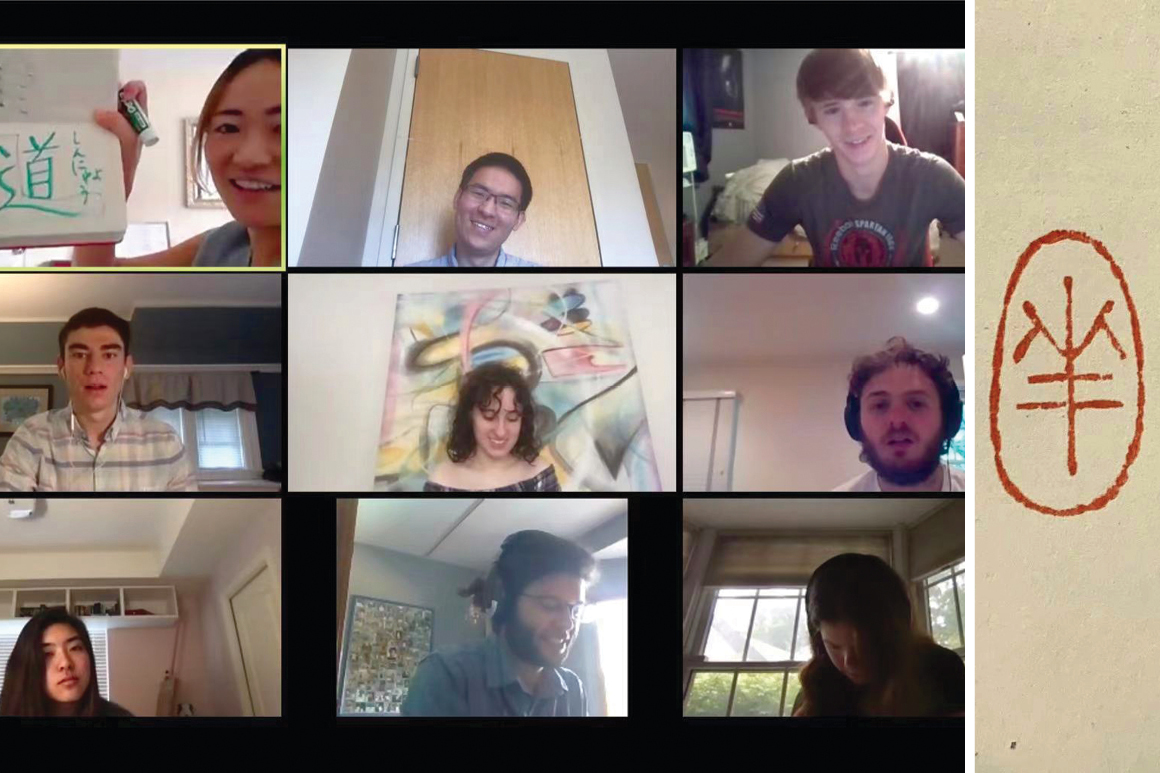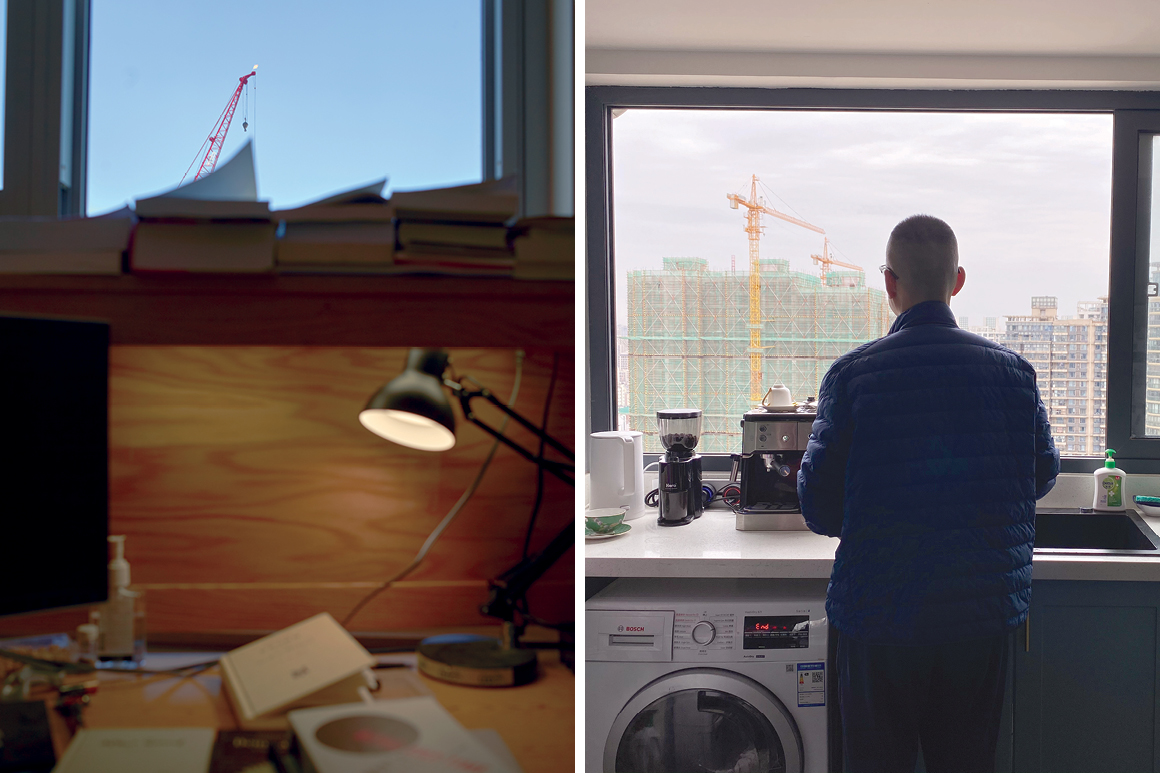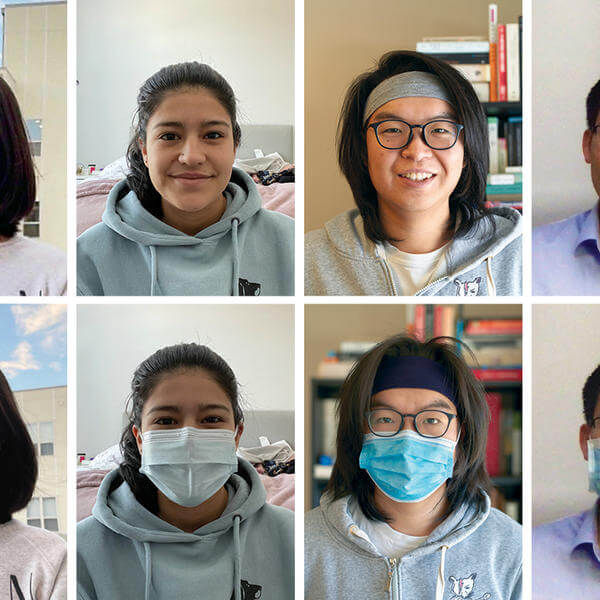Nearly all Holy Cross alumni have experienced life on a bustling campus, from noisy, packed dining spaces to hilly paths teeming with foot traffic. But when the pandemic forced students to return to their homes last March, a small group of mostly international students remained on The Hill for six months, experiencing a Holy Cross like no other in its long history.
"[For international students,] there's a lot of adjustment that goes on, even in a 'normal year,'" says Christina (Tina) Bi Chen, assistant dean of international students. She notes that the culture shock that comes with living in a new environment can leave students feeling even farther from home: "It's everything from 'Can you get your favorite candy or your favorite comfort foods?' to 'When you look out your window, does it look like a completely alien place?'"
Chen, known as "Dean Tina" to students, says that despite the challenges, she sees international students thrive across all majors, programs and activities at Holy Cross — in many cases, while speaking their second language.
Last March, international students faced a new hurdle: daunting barriers to returning home, ranging from getting travel authorizations to navigating travel restrictions. "There is a lot to think about — you don't just pack up and leave," Chen says.
More than 60 international students were ultimately unable to make it home to their families, prompting Holy Cross to offer them the option of continuing their on-campus room and board — something Chen notes not all higher-ed institutions immediately offered at the time. She credits a team of "unsung heroes" from multiple College offices and divisions with making it all work, especially chef Linda Jesse and Neil Domina, assistant director of residential dining; Ed Coolbaugh, assistant dean of students and director of residence life and housing; and Ryan Grant, senior associate director of residence life and housing. Major transitional projects included moving students into two-bedroom apartments in Figge Hall, each with its own full kitchen, living room, dining area and bathroom; surveying students on their food preferences then converting Kimball Dining Hall into a fully stocked "grocery store;" gathering rice cookers, pots and pans for use in the students' kitchens; and much more.
By St. Patrick's Day, Mount St. James, normally home to about 3,000 students and 1,000 employees, was empty, save for the students who would soon move to Figge, the Jesuit community, two construction crews and a handful of employees from departments such as public safety, dining services and facilities. It would remain that way for the next six months.
Jinze Mi 羋金澤 '23
(history and art history double major, Asian studies minor from Tientsin, China)
In the early days of the pandemic, securing personal protective equipment was a scramble for everyone. As Holy Cross was waiting for its orders to arrive, Jinze Mi '23 joined an effort to help. "I collaborated with Yue Wang, a Chinese graduate student leader at WPI, to get some supplies from New York and other states," Mi shares. "We collected more than 1,000 masks, as well as alcohol hand washes and some medicine."
They ultimately gathered enough to distribute not just to students but also to other members of the College community. "Professor Ke Ren of the history department and his wife, Mimi Tang, drove through campus and distributed the supplies to me, and I then distributed all the supplies," Mi recalls.
Living on an empty campus, Mi found even more solitude in Figge, as he had an entire suite to himself. "I had no roommates, so I lived in a room that normally four people live in," says Mi, who found playing classical music in the background helped fill the quiet.
"Before I came to the States, my mom taught me how to cook some food, both in the Chinese style and the Western style," Mi says. Using fresh ingredients from the Kimball "grocery store," Mi spent many evenings practicing his culinary skills. "I really appreciated the hard work of the Kimball team and Dean Tina," he says.
Mi, who aspires to one day pursue a Ph.D. in early Chinese art and archaeology, stayed busy over the summer taking an online Japanese language course at Middlebury College and working as a research associate on the history department's COVID Chronicles project, in which students documented oral stories from the pandemic. The only first-year student in the research collective, Mi focused on capturing the experiences of Chinese international students and says he's "incredibly proud" of what the team was able to create.
A resident of Mount St. James since his arrival in August 2019, Mi says he's most looking forward to seeing his parents and grandparents when he returns to China: "It's been so long."
What helps remind you of home? "I have a Chinese family seal. I learned how to write the ancient Chinese scripts and how to do the seal carving at a very young age under the direction of a renowned scholar in my home city. I keep it with me, and it reminds me of my family."
Zicong (Chris) Li 李孜聪 '21
(philosophy major from Shanghai, China)
As the majority of students were returning to their families last March, Zicong (Chris) Li '21 was moving into Figge. Settling in, he looked out his dorm room window and found an unexpected reminder of home.
"My room in Figge faced [the performing arts center construction], and I have exactly the same situation in my home in Shanghai — I have a construction site right outside my window," Li says. "Every morning, my dad makes himself a coffee and just looks at the construction site. He says you can see how the city develops and get a fresh start for your day." So Li started doing the same thing every morning, thinking of his dad while watching building progress unfold day by day.
At the beginning of the pandemic, Li says he and his parents were worried when they heard that some international students in the United States were abruptly losing on-campus housing. "This didn't happen at all [at Holy Cross]," says Li, noting the College went above and beyond his expectations. "The situation was bad for everyone, but the school tried their best, especially Dean Tina — that's why I'm so enthusiastic in helping her."
Early last spring, when so much was changing — even hourly — Li and a few other students offered to act as communications liaisons for Chen, helping relay information back and forth to students in Figge and translating College updates for students' families in China.
"Suddenly, students have to make frequent trips to the supermarket to buy supplies to prepare for the time coming. All kinds of different needs fell on Dean Tina's shoulders. So to help her, we would basically make a list of what students needed and help each other out," says Li, who also coordinated trips to the store as one of the only students on campus at the time with a driver's license.
What was remarkable, Chen notes, was the way the students lived as men and women for and with others. Students didn't just help each other — they also reached out to staff, says Chen, who recalls Li offering to share with Holy Cross maintenance staff the then-impossible-to-find face masks his parents had sent him. Thousands of miles away from their families amid a historic, ever-changing event, the students demonstrated that they have taken their Holy Cross education to heart, Chen says.
Li is quick to recognize the efforts of a caring staff: "I want to give a big appreciation to all of the Holy Cross staff: the workers in Kimball, all the residence maintenance staff, the public safety officers, health services. I saw them work seamlessly over the whole time; they were the people who were making everything work."
What are you looking forward to when you return home? "A haircut! I haven't had a haircut since I left home in January last year. I usually get my hair cut in Boston — I go to Chinatown, so I can speak Chinese with the person who gives me the haircut, which is nice. I'm looking forward to my haircut when I go home."
Claudia Davila '20
(psychology and studio art double major from Lima, Peru)
"I started running around campus every day," says Claudia Davila '20, about how she passed her time on the quiet campus. "I ran different routes every single time, so I never passed by the same places in the same order. I tried to run around the entire campus to see if I could do it. In the beginning I was dying, but by the end, I was running around nonstop for an hour at a good pace, which was really nice."
Following graduation in May, Davila planned to return to Peru and start her career, but the pandemic forced her to change course. "Here [in the U.S.] I feel like it's very typical to move out [of your family's house] as soon as you graduate from college, but that's something I hadn't planned on doing; I had planned on going home," Davila says. "It's very typical at home [in Peru] to live with our parents."
Figuring out how to now navigate an unexpected job search in the U.S. was daunting at first. "It's definitely different applying for jobs in the U.S. than Peru, so it wasn't like I could really ask my parents specifics," Davila notes. She says meeting with a career counselor from the Center for Career Development via Zoom to review her resume and learn interview tips was key: "That was a huge guide." And Chen was there to help Davila navigate the visa and work authorization processes. "There were certain jobs that couldn't take me because they didn't accept students with the visa I was applying for," Davila explains. "[Dean Tina] walked us through everything."
Davila landed a job at the New England Center for Children as a teacher working with adults with autism and moved into her own apartment in nearby Framingham, Massachusetts: "Building my own life here, at least for a year, was something big."
Years from now Davila says she'll most remember how supported she felt during this time: "My friends' parents were always asking if I needed anything. It's really nice knowing I can turn around any corner and have someone there."
What helped remind you of home? "I cooked a few typical Peruvian dishes from home for my friends. I made lomo saltado — it's beef that's sautéed with onion and tomatoes, and you serve it with french fries and white rice. Usually people season it with soy sauce and other spices, but I tried to adapt and see what I could find."
Xinmeng (Brenda) Duan 段昕萌 '22
(psychology and religious studies double major from Dalian, China)
With so few students on campus last year, most buildings were dark and dormant. Xinmeng (Brenda) Duan '22 says she basically followed a "triangle" between the few buildings that were still open: Figge, Hogan Campus Center and Kimball.
The limited options pushed her to expand her routine. "Everything was locked, so we had to discover new places on campus," she says. "My roommate and I had this habit of taking a walk after dinner." One day, they wandered up to the Athletics fields on upper campus for the first time. "[The view] is really, really pretty," Duan says. "Around 9 p.m., you can see all the stars."
For entertainment, a long tucked-away Mahjong game set brought hours of entertainment to Figge. "An upperclassman passed it down to us two years ago. My roommates and I always had it, we just didn't have enough people," Duan says. She and friends began holding twice-weekly games within their Figge bubble. "Because of this virus and not being able to go back, [my friends and I have] become a closer community, and I've gotten to know them really well," she says. "We had a lot of fun playing Mahjong and sharing our stories and experiences together."
Researching and making new recipes also kept Duan busy, as did taking frequent trips to Kimball to restock her kitchen: "It was literally like a grocery store! They had everything." And when she wanted a taste of home, she picked up luosifen, a spicy noodle dish, from an Asian grocery store in Worcester.
Duan discovered that writing in a weekly reflection journal for a psychology course gave her an outlet to process not only what she was learning in class but also her personal thoughts. "We were reading Sigmund Freud's 'Civilization and Its Discontents,' and I thought it was relevant for the time. So I was reflecting on human nature and the nature of global crisis," Duan says. "For my own spiritual and intellectual development, [writing] was really good."
What are you looking forward to when you return home? "My parents' cooking. I'm the only child, so when I'm not home they cook one dish for a meal. When I'm home, they cook a lot. Their cooking is really good!"
Written by Meredith Fidrocki for the Spring 2021 issue of Holy Cross Magazine.
About Holy Cross Magazine
Holy Cross Magazine (HCM) is the quarterly alumni publication of the College of the Holy Cross. The award-winning publication is mailed to alumni and friends of the College and includes intriguing profiles, make-you-think features, alumni news, exclusive photos and more. Visit magazine.holycross.edu/about to contact HCM, submit alumni class notes, milestones, or letters to the editor.


